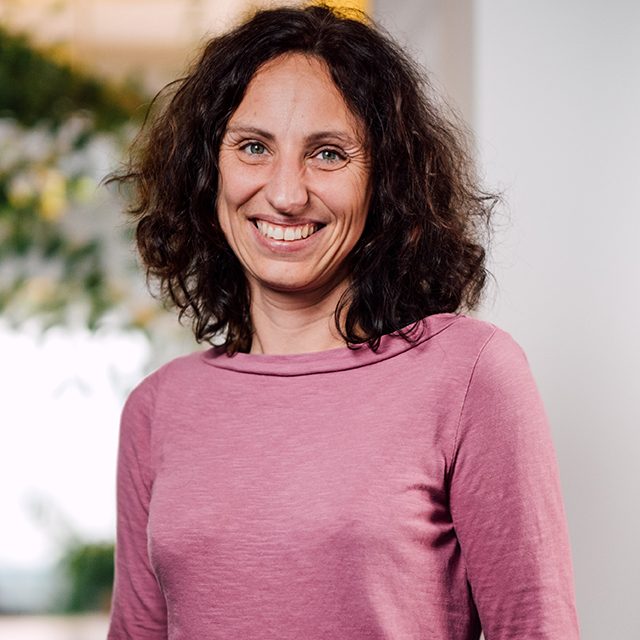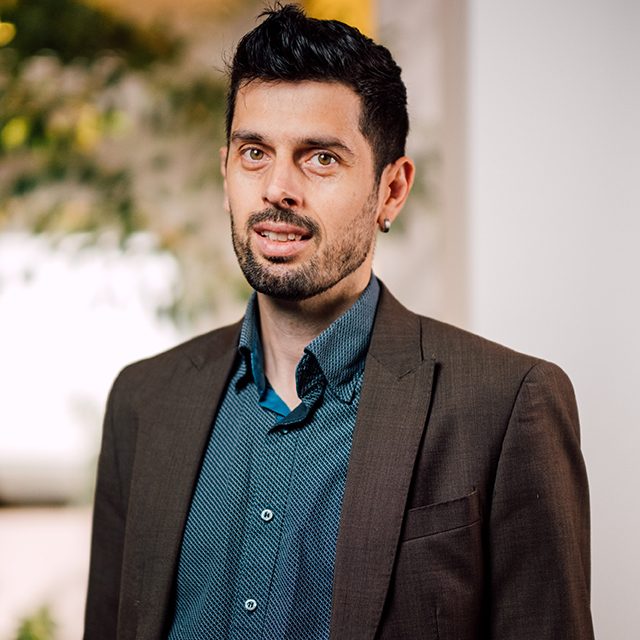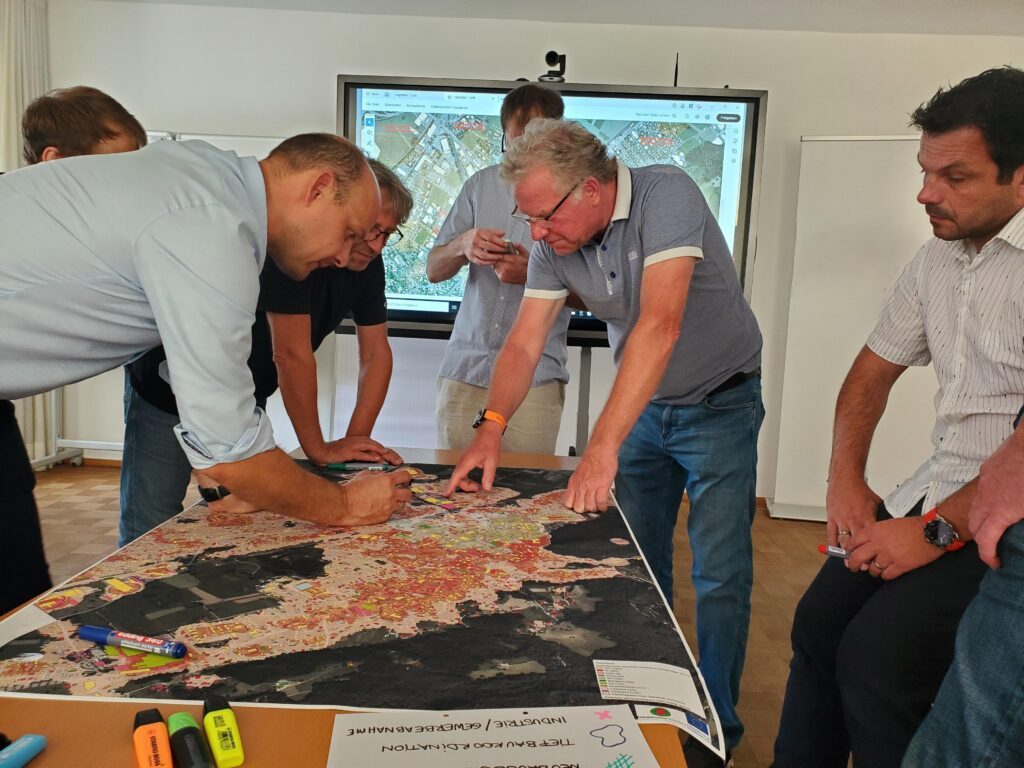Spatial energy planning
Rational energy utilisation and the expansion of renewable energy are essential for sustainable economic activity in cities and municipalities. Spatial energy planning creates the basis for coordinating energy supply in line with structural developments and responding to current challenges. The SIR provides support with selected instruments for spatial energy planning and helps to develop strategies for the heat transition.
Energy in spatial development planning
With the amendment of the Salzburg Spatial Planning Act in 2017, the topic of energy has also found its way into spatial planning in Salzburg at municipal level. The SIR supports the municipalities of Salzburg in dealing with the topic of energy in the spatial development concept (REK) with the ‘Energy Inventory Analysis’. This report comprises comprehensive, meaningful data at property level – on energy requirements, supply infrastructure and renewable potential – based on more than one hundred data sources that are subject to constant updating routines. At the request of the municipalities, site-specific analyses are presented graphically and in text form in the inventory analysis. These are presented and discussed together in an on-site meeting. This service, which is available free of charge to Salzburg’s 119 municipalities, creates the basis for the strategic and planning anchoring of energy issues in the REK and beyond. The service can also be requested by Salzburg’s regional associations as part of the preparation of regional programmes.
Energy and climate strategies for municipalities and regions
The use of the data available in the heat atlas is not limited to official planning purposes such as the REK or the regional programme. Municipalities and regions can use it to develop potential surveys and strategies with the involvement of stakeholders such as companies, private individuals and associations. Here too, the SIR offers support for municipalities and regions in the form of scenario calculations (e.g. ‘municipality with 100% renewable energy supply by 2035’), the development of action plans and support with detailed planning for specific projects.
Municipal heat planning
Municipal heating planning is a specialised area of spatial energy planning. Replacing fossil-fuelled heating systems is an important political priority. Federal and state targets as well as some EU requirements (EED III, Art. 25 Para. 6) require active steps to be taken and the replacement of heating systems has been promoted in recent years with extensive subsidies. The municipalities can make a significant regulatory contribution here by promoting the best supply options in each case. Heating networks play a special role here as essential municipal infrastructures. In order to be able to achieve this, the appropriate planning expertise is required in addition to the information provided by the state. As part of the ‘klimaaktiv Heizwerke und Wärmenetze’ programme, we have developed the ‘Dialogue on heating networks’ manual as the responsible consortium partner and thus actively support municipalities in municipal heating planning.
Feasibility studies
Larger generation plants based on renewable energy sources in the electricity and heat sectors are highly relevant for the success of the energy transition. At the same time, they are sensitive and complex to implement and often require long lead times. With the support of the state of Salzburg and in cooperation with relevant expert institutions and research partners, we organise and support feasibility and exploratory studies for large-scale projects in the field of sustainable energy supply. Examples include the SOBOS (deep geothermal energy) and BigSolarSalzburg (solar thermal energy and storage) projects.
Energy inventory analysis
Since 2021, the SIR has been providing the ‘Energy Inventory Analysis’ to municipalities free of charge. A total of 80 municipalities have already received an energy inventory analysis, and a presentation and consultation meeting has been held in 31 municipalities. The SIR also advises the municipalities on how to implement the topic of energy in the spatial development concept. The SIR also prepares status and potential analyses of the energy situation in the region for the regional programmes that are mandatory for Salzburg’s regional associations. The Salzburger Seenland regional association, for example, was the first regional association to begin addressing the topic of energy in 2021 as part of the process of drawing up a new regional programme. SIR provided intensive support for this process with research and data preparation as well as consulting services.
Energy and climate strategy Dienten
Building on the efforts of the KEM Nachhaltiges Saalachtal since 2012 and the Agenda21 citizen participation process on the topic of sustainability in 2017, the municipality of Dienten am Hochkönig wanted to develop a comprehensive climate and energy strategy in order to be self-sufficient in renewable energy by 2040. As part of a LEADER project in 2024, the SIR worked with the municipality to calculate a ‘renewable scenario’ for 2040 and, based on this, developed the necessary measures for each target group (private individuals, agriculture, hotels, mountain railways, municipal infrastructure, etc.). The municipal administration is already working towards climate neutrality within its own sphere of influence: The municipality’s own buildings are being successively renovated and heated with renewable energy, and the conversion of the vehicle fleet to renewable drive systems is being driven forward on an ongoing basis. For example, a new e-transporter was purchased for the sewage treatment plant in 2024 to replace its fossil-fuelled predecessor, the new sewage treatment plant will be equipped with a PV system and the waste heat will be used to heat the sewage treatment plant operations building and the building yard.
Potential surveys in climate and energy model regions
In order to develop targeted measures for their regions, the five Salzburg climate and energy model regions (KEM) must regularly survey the energy situation and renewable energy potential in their implementation concepts. SIR has now been authorised to carry out these potential surveys for the KEM Fuschlsee-Wolfgangsee, the KEM Pinzgau National Park Region and the KEM Nachhaltiges Saalachtal on the basis of data from the heat atlas. The results can be found in the implementation concepts of the respective regions and form the basis for objectives and concrete project planning.
klimaaktiv dialogue on heating networks
As the urgently needed energy hubs, heating networks allow the integration of a wide variety of renewable heat sources and are therefore a central component of the heating transition. A structured dialogue between the municipality and the local heating network operator enables effective planning and efficient implementation for both sides – in the densification of existing networks as well as in their expansion. In Salzburg, the heat atlas provides us with the ideal database to conduct this dialogue effectively. As part of klimaaktiv, the SIR has developed the heating network dialogue and implemented it in several municipalities throughout Austria. The dialogue between municipalities and heating network operators is used to drive forward the use and expansion of existing heating networks in a structured manner by
- identifying and driving forward demand,
- coordinating the development of new routes and
- improving the cost efficiency of construction by combining pipeline construction with other infrastructure projects.
Masterplan WÄRME Rheintal/Walgau
The aim of the project was to develop a heating master plan that not only shows the path to decarbonisation, but also forms the basis for a realistic translation into political instruments and administrative measures by taking planning and legal possibilities and requirements into account and provides a solid framework for the implementation of an energy planning system. The Rheintal/Walgau region has been worked on as a representative of the entire Vorarlberg region. During the realisation together with the partners e7 and RSA iSPACE, the findings from the implementations in Salzburg and from the GEL S/E/P project were used.
SOBOS - Cross-border utilisation of deep geothermal energy
The EU-funded feasibility study SOBOS analysed the potential of a cross-border heat supply for the Salzburg-Upper Austria and South-East Bavaria region based on deep geothermal energy and waste heat. The background to this is the extensive geothermal resources in the border region, which can only be distributed via a comprehensive transport network. In order to define the optimum size of the heat network, all heat sources and sinks in the study area were analysed. Under the leadership of Regionalwerk Chiemgau-Rupertiwinkel, SIR was responsible for the Salzburg region for
- processing and interpreting the heat planning data
- coordinating a feasibility analysis for a deep borehole and for
- exploring available funding and
- stakeholder management

Fionn Herold, BSc, BEd, MA
Energy communities

Ivana Gramatikova, M. Arh
Spatial energy planning

Dipl.-Geogr. Judith Draschl, MSc
Spatial energy planning

Oskar Mair am Tinkhof, MSc
Settlements and neighbourhoods

Christina Standl, MSc
Spatial energy planning
